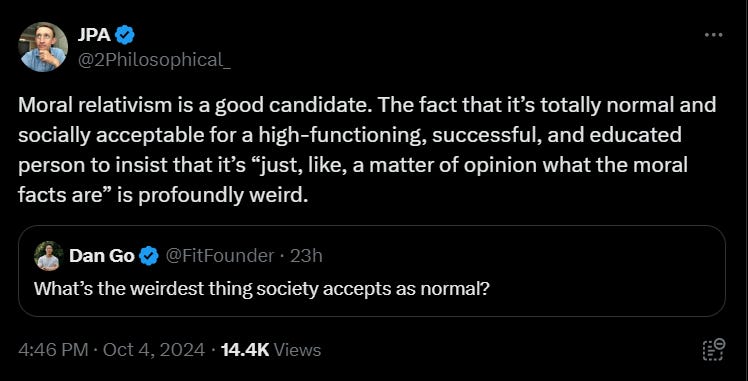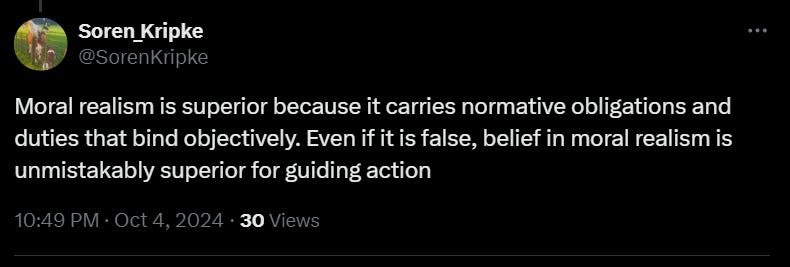Twitter Tuesday Roundup for 10/15/2024
Twitter Tuesday #33
Twitter is full of terrible takes on metaethics. There are so many I’m pretty much drowning in them at this point. Despite people responding to these bad takes in the comments with challenges and corrections, it’s often the same people who continue to reiterate the same tired mistakes, present the same bad arguments, and engage in the same rhetorical swipes at antirealists, desperately attempting to make us look like stupid, evil psychopaths.
This time around, Twitter Tuesday will be a roundup of a variety of different tweets. I’ll start with some of the bad takes on metaethics, but I’ll touch briefly a couple other topics as well (the state of psychology and consciousness).
1.0 Is it weird that relativism is accepted as normal?
First up, we have this response from JPA to another tweet, asking “What’s the weirdest thing society accepts as normal?”
1.1 Technical and colloquial conceptions of relativism
I don’t think moral relativism is a good candidate. “Moral relativism,” insofar as it appears in popular discourse, is a fuzzy term that mashes together a variety of different views. I tend to distinguish this “folk relativism” from philosophical positions that are typically more specific and well-developed. So what is “folk relativism”? That is, what do nonphilosophers mean when they say things like “morality is just like, your opinion man”? That’s an open empirical question. It’s not at all clear that they’re expressing any distinctively or exclusively metaethical position, much less one that corresponds to technical formulations of relativism that philosophers defend. It is far more likely to be various crude amalgamations of descriptive, normative, and (maybe) some metaethical claims, i.e.:
The empirical claim that people and cultures have different moral values
The normative claim that one shouldn’t impose their moral standards on other cultures or judge people or cultures by one’s own moral standards
The metaethical claim that moral truth depends on the standards of different individuals or cultures and can therefore vary between individuals and groups
Everyday references to “relativism” are routinely unclear, and may or may not involve one or more of these notions, and perhaps somewhat different or altogether different notions, all mashed together in a confused and confusing lump.
Philosophers that criticize “relativism” are often unclear about what their target is: this weird folk chimera, or technical, metaethical positions discussed in philosophy. Objections to one may or may not apply to the other. Merely because some folk notion is confused or objectionable doesn’t mean that its technical analog suffers from the same problems.
Nevertheless, let’s just grant for the sake of argument that there’s something to the notion that some kind of relativism is widely accepted, that lots of nonphilosophers are some kind of “relativist”, and they really do think that moral facts are a “matter of opinion.”
What’s weird about this? JPA doesn’t say. I don’t find anything weird about it. It may be a bit of a mixed bag. On the one hand, “folk relativism” is often associated with a vague sort of tolerance for different people and cultures. Generally speaking, tolerance is often a good thing. But it depends on what you’re tolerating. Tolerating another culture’s benign burial practices? Sure, that’s good. Tolerating another society’s penchant for brutally maiming anyone who wears a hat? Yeah, not so much.
I find it just as objectionable as moral realists when the “tolerance” encouraged by “relativism” fosters a complacency about intervening in other people’s choices, whether it be individuals in your own society or people in other cultures. While all else being equal I’m in favor of leaving other people alone, I’d find it objectionable if anyone’s commitment to “relativism” led them to be indifferent to or reluctant to intervene if they saw someone committing a crime, or if there were an ongoing genocide in another country.
However, these normative consequences are a product of a person’s normative moral attitudes or a commitment (at best) to some type of agent relativism. The former isn’t a form of metaethical relativism at all, so it’s hardly grounds for objecting to metaethical relativism as a philosophical position. The latter is both a metaethical and a normative moral view. I’ve spoken about this before, but agent relativism holds that whether an action is right or wrong depends on the moral standards of the agent (or culture of the agent) performing the action. If a person thinks it’s morally permissible to murder, then it is in fact morally permissible for them to murder. Each individual becomes a self-legislative authority over their own moral conduct.
Critically, this authority extends to other people. If someone thinks it’s okay to murder, then it is in fact okay for them to murder, in such a way that everyone else has an obligation to accept this. What do critics find objectionable about this type of relativism? It means that one has no legitimate moral grounds to object to other people doing awful things like torturing babies. Ironically, then, precisely what’s objectionable about agent relativism is that it imposes moral rules on everyone that are binding and authoritative independent of their own goals and values.
In other words, the primary (if not only) objectionable feature of agent relativism is that it functions … a lot like moral realism. It tells those of us who are against torture and chaos and all the bad things that Sauron and his merry band of orcs aren’t doing anything wrong because they don’t think that they’re doing anything wrong, and that we should just back off and let them conquer Middle Earth. This is a ridiculous position, and it may very well accord with some features of folk relativism: you will sometimes hear people express reluctance to condemn slavery or genocide in some other culture because “it was considered acceptable at the time.” This is repugnant. But antirealists, and even other relativists, are no less capable of expressing repugnance in a way consistent with their antirealist views than realists are.
Appraiser relativism doesn’t have this problem, yet critics almost never mention it. This is convenient for them, since precisely what’s so objectionable about agent relativism doesn’t apply to appraiser relativism at all. I leave it as an exercise for readers to consider why critics of relativism would ignore the distinction and tend to focus their objections on agent relativism.
Even professional philosophers that are critical of relativism often fail to disambiguate different forms of relativism: Is JPA objecting to folk relativism, with all the normative features it commonly involves? If so, then I’m against it, too. Or is JPA against metaethical relativism? If so, then which kind? Agent or appraiser? Cultural or individual? … (and so on, regarding other distinctions)? We’re simply not told.
This is one of those weird things I find frustrating about philosophers. The ironic lack of precision and clarity one routinely observes if one pays careful attention. JPA simply isn’t clear about what he’s objecting to. One could cash out “relativism” in a variety of ways, and it shouldn’t be especially difficult for a philosopher to do so. Yet JPA just…doesn’t.
1.2 Relativism isn’t socially acceptable!
To me, the most eyebrow-raising aspect of JPA’s tweet is that he not only finds it weird that relativism is considered normal, but seems to find it objectionable that it’s “socially acceptable for high-functioning, successful, and educated” people to endorse relativism.
Is JPA suggesting that it’s not socially acceptable to endorse moral relativism? This is quite a strong claim. I rarely hear philosophers insist that holding a contrary philosophical position isn’t even socially acceptable. Why should we consider relativism socially unacceptable? Before we answer any of those questions, it’d be helpful to know what conception or conceptions of relativism JPA considers socially unacceptable. Unfortunately, JPA has opted (so far, at least) not to respond to me, so I’m unlikely to get a direct response. If tolerance for repugnant views is what we’re supposed to regard as socially unacceptable, then I’d agree. If metaethical views that have nothing to do with one’s normative moral standards are what are supposed to be socially unacceptable, then it’s not clear to me why.
JPA isn’t the only one to express these sentiments:
I’m astounded at how many people don’t hold these views. I hold all of the first three positions. The fourth is a bit obscure, “And humans innate experience of those things is an illusion.”
This seems to presuppose that people have an “innate experience” of what is presumably some form of moral realism, free will, and transcendent “Truth”. And we allegedly hold that these views are an “illusion.” I’m not quite sure what that means, but I don’t think that they are illusions: I deny that it’s the case that most people have an “innate experience” of any of these things in the first place. To the extent that Ryan or others believe they have experiences of moral truth or free will or transcendent Truth (not sure why it has a capital “T”), I don’t think these experiences are innate; I think they’re learned.
Note how this person is simply helping themselves to the presumption that most people experience the world in a particular way. There is no compelling empirical evidence that most people have any of these experiences, though. This is an armchair psychological claim that simply isn’t supported by available evidence. Commentators on such topics routinely make claims like these: they feel entitled to make sweeping declarations about how people think in the almost total absence of supporting evidence.
1.3 Telepathy & psychopathy
Here we see another common remark that critics of those with the various skeptical/anti- views:
When such claims are made, there is rarely anything by way of compelling argument or evidence. Those who think it’s obvious that moral realism is true, or that we have free will, and so on often find it hard to believe others don’t share their views. Is it really so hard for people to accept that other people don’t believe what they do?
Here’s another instance of a similar claim:
This is just armchair psychology run amok. This person is simply not in a position to know that all relativists disbelieve relativism.
The follow-up to the first instance of this questionable armchair psychologizing gets worse:
I don’t know of any evidence that would support the claim that relativists are psychopaths. This is a very strange claim. Psychopathy is characterized by poor impulse control, egocentrism, lack of empathy, and a host of traits that often facilitate antisocial, violent, or manipulative behavior.
Unfortunately there’s not enough elaboration here to know what they have in mind, though: is this a critique of metaethical relativism or folk relativism? If the former, the claim is absurd. Most antirealists have similar moral values as realists. Maybe some agent relativists become indifferent to human suffering in troubling ways, but this is hardly an indictment of other forms of relativism, and in any case it’s not clear whether folk relativism typically entails appraiser relativism.
Note that even if a critic were to insist this is just a critique of folk relativism, then why does this so often seem to bleed over into how they treat philosophical antirealists, who almost never hold such repugnant normative moral views?
We might also wonder whether a commitment to moral realism could amplify “psychopathic” tendencies: if one is committed to carrying out actions that one thinks are “morally required” regardless of whether they comport with one’s attitudes or values, one may feel compelled to commit great acts of violence or other malicious actions that they might otherwise have difficulty complying with. Should we be wary of moral realists due to their potentially dangerous commitment to acting on what they believe the stance-independent moral truths require of them? I’ve sometimes speculated that a strong commitment to moral realism could be associated with suppressing one’s empathic impulses, overriding one’s personal sentiments, and grudgingly executing the binding mandates of moral truth by tamping down one’s own conscience. I suggest calling this something like the “just following orders” defense:
Imagine a realist torturing or killing people. They don’t want to. It’s not what they desire or prefer. But they are convinced that there are stance-independent moral facts, and that they are therefore required to do so. Think of the Milgram experiments. The participant is tasked with administering shocks to someone else. The shocking results are that many participants will continue to follow orders to shock what is in actuality an actor only pretending to be shocked, right up to the point of causing apparently (but not actually) serious harm or even death, all because they were ordered to do so. When people expressed reluctance, the experimenter followed a script that included lines like “The experiment requires that you continue.” One could imagine a moral realist flaying the flesh off of someone, tearfully apologizing, and saying to their victim:
The stance-independent moral facts require that I continue.
The realist could defend their actions by insisting they’re just following orders:
“Don’t be upset with me for brutally torturing and killing people. I didn’t want to. It’s just that the moral facts required it of me.”
Realists may insist that the moral truths would never require this of them. That’s quite the conceit. It’s one thing to be confident there are stance-independent moral truths. It’s quite another to be confident they will just so happen to be sufficiently agreeable to your personal preferences, desires, and values that you won’t find them too objectionable.
Should we antirealists start publicly accusing realists of being unwitting stooges for an indifferent and impersonal cosmic authority? No. This would be stupid. If there actually were a tendency for moral realists to flay people or kick puppies, maybe I’d be concerned. But there isn’t, nor is moral realism associated with psychopathy.
This is also mostly moot anyway, since I don’t think most people have substantive metaethical views, nor do I think, if they did, that this substantially impacts their behavior. Worries about the impact of metaethical positions on people’s behavior strike me as strange and unmotivated. There’s little evidence most people even have metaethical views about realism and antirealism, much less that they have a substantial impact on their behavior.
1.4 Relativists contradict themselves
Another common trope in the arsenal of bad objections to antirealist positions is the insistence that relativists “contradict themselves.” Here’s one instance of this:
Here’s a kind of performative contradiction an agent relativist may be subject to:
They think it’s morally wrong to judge people with different moral standards
They judge people with different moral standards
A performative contradiction is not a contradiction that shows that a person holds inconsistent beliefs. It merely illustrates that a person fails to act in accordance with their own alleged commitments. This may be a reason to think they’re not “really” committed to what they say they are (whatever that would mean), but it might also be attributed to weakness of will or other factors. Do most people insist moral realists aren’t realists if they fail to abide by their moral standards? I don’t think people typically do this. Do most people think a person isn’t “really” a utilitarian if they don’t constantly appear to be impartially maximizing utility? I don’t think most people think this way, either. I think most people believe that a person can have commitments that they aspire to but fail to live up to. I see little reason to think relativists should be seen any differently.
However, this is already granting too much to this objection. This is because this type of performative contradiction would at best only apply to some forms of agent relativism, and would not apply to other forms of relativism, such as appraiser relativism.
This is also assuming this is the actual way in which this person supposes that relativists are contradicting themselves. It may not be. Sometimes critics who insist that relativists “contradict themselves” insist that they’d be contradicting themselves if they objected to other people’s actions or judged other people in any respect at all. But nothing about many standard forms of relativism bars one from having moral judgments or imposing one’s moral standards on others in at least some contexts. When it comes to appraiser relativists, this is especially the case: nothing about appraiser relativism limits the ability of the relativist to judge others, impose their standards on others, or act on their own values without regard for other people’s values at all.
In short: the common claim that relativists “contradict themselves” is almost always wrong, often in multiple ways that overdetermine just how wrong it is. Such objections often conflate different senses of “contradiction,” fail to disambiguate different forms of relativism, some of which their objections don’t apply to, and mistakenly suppose it’s inconsistent with relativism to judge others or act on one’s own moral values.
2.0 Staying in your lane
Here’s another interesting exchange. Someone asks what they’re wrong about, and the first response is “Moral antirealism.” Where things get interesting are in a set of replies that follow:
Nathan says to someone “stay in your lane” and to “stick to things you have genuine expertise in.” Anna, quite reasonably asks whether something was said that displays ignorance of the literature and for Nathan to point out some “egregious error”:
This is where I was a bit puzzled. Nathan criticizes Anna for saying something “sloppy,” then eventually responds with the following:
There is no tension in an antirealist about thinking that something is “bad.” An antirealist about value only holds that there are no stance-independent truths about value. Saying or thinking that something is “bad” is in no way in tension with most normative antirealist positions. Maybe some non-fictionalist error theorist would opt not to use normative language, and perhaps a few others might, but by and large relativists of various sorts, proponents of nonrelativistic stance-dependent accounts (ideal observer theory, various constructivist positions, etc.), various noncognitivist accounts, quasi-realism, error theorists that are fictionalists, and so on are going to have no problem with using normative language.
Given this, it’s ironic that Nathan would be telling someone they should stay in their lane and accusing them of being sloppy: Nathan’s remark here is at best sloppy, and at worst, is simply incorrect. If you’re going to tell someone to stay in their lane, it’s best to avoid getting into an accident at the next intersection.
Credentials alone are no guarantee that one avoids sloppiness or error.
3.0 A minor disagreement
A brief interlude to express a minor disagreement. We have this remark:
The situation for the classics may be far more dire than psychology, but I’d hardly say that psychology is “doing great.” While people may have started to speak of the replication crisis in the past tense, I don’t think it is over, or ever will be over, until far more revolutionary reforms sweep the field. Modest uptake in preregistration, larger sample sizes, and a generally heightened awareness of p-hacking, along with a handful of other improvements, may have yielded some modest, or even significant improvements, though I’m not even sure of that.
Whatever they’ve achieved, though, is so far from revitalizing the field and setting it on the right course that I worry the field will languish for decades. Maybe the advent of AGI will obviate all such concerns (either because it kills us all or solves all our problems), but if not, then I don’t see the field making nearly as much progress as it should be making.
4.0 JPA on consciousness denial.
Returning to JPA, we have this remark about consciousness:
I must begin with the obligatory reminder that most in the illusionist camp don’t “deny consciousness.” What we deny is that consciousness involves special, ineffable phenomena that fall outside the realm of empirical inquiry. Denying that consciousness is, to my mind, basically magic is not a denial of consciousness. It’s a rejection of prescientific thinking about the world.
Anyway, JPA suggests that one of the motivating factors behind our doing so is that we “might be souls.” This is an interesting suggestion. JPA says that the answer is “obvious.” Obvious to who? JPA? It’s a bit strange to claim that it’s obvious what people’s unstated motives are. What motivates myself and others to hold views JPA considers a denial of consciousness is an empirical question. To my knowledge, JPA is not a psychologist and has provided no data whatsoever to sustain claims that we endorse philosophical positions because we don’t want to “admit” that we “might be souls.”
Speaking for myself, this suggestion is farcical. I am not the least bit concerned with whether there might be souls. I am no more concerned with this possibility than I am concerned that there might be goblins and elves. JPA may not appreciate just how much many of us have shelved the kinds of supernatural speculations he takes seriously. To me, they exist right alongside myths about dragons and stories about Hercules and Poseidon.
Notably, this expresses only my epistemic attitude towards souls. On a personal level, I am not threatened by the possibility that there could be souls. Why would I be? If there are souls, then there are souls. Great. Were it possible to believe in an afterlife, sincerely enjoy a community of fellow believers, and so on, I might go in for all of that. I don’t not because it wouldn’t be good for me, but because I can’t compel myself to believe what strikes me as complete nonsense. To put it bluntly: I wish I were a soul that would go on to survive death in some cool afterlife, or to be reincarnated, or whatever.
At any rate, as I noted on Facebook:
This cuts both ways. Perhaps JPA and others are equally motivated to reject views like ours because it would threaten the metaphysical beliefs needed to give them a sense of meaning and value. Of the two possibilities, I find it far more likely that it is the other side that are especially desperate to maintain implausible views because it is they who seem to me to wish to avoid unpleasant implications. Whereas I completely embraced the unpleasant implication of my views. What would be my motivation for that? Granted I am sure you could find one but I think there is more at stake for them than there is for me.
In other words: anyone who believes in souls and all the goodies that come along with them has a lot to lose if they stop believing in them, whereas I have quite a bit to gain if I did believe in them. It’s strange, given this, to psychologize with such confidence that the rejection of a philosophical position (with a somewhat tenuous connection to souls in the first place) is motivated by some kind of anti-theistic tendency, without seemingly recognizing that one’s own views may be just as motivated.
5.0 Bold claims
Here we have a bold claim about the superiority of realism:
Why does this make it superior? How do they “bind objectively”? Let’s suppose there are moral norms. What exactly does this binding entail? Does it mean I can’t just ignore them? Suppose I do ignore them: then what? What happens?
I break out this quote now and again, and this seems like one of those nows or agains:
Why care about objective value or ethical reality? The sanction is that if you do not, your inner states will fail to deserve folk-theoretical names. Not a threat that will strike terror into the hearts of the wicked! But who ever thought that philosophy could replace the hangman? - David Lewis
The idea that moral realism has some kind of edge because it has the power to “bind objectively” is a hollow promise. Such objective binding does nothing and achieves nothing. The only extent to which anyone is subject to moral authority is the extent to which we enforce moral norms on one another. Antirealists are no less capable of doing so than realists.
6.0 Rights make no sense for atheists
This one is just weird:
As much as I’d like to say otherwise, there is no inconsistency between atheism and moral realism, so atheists could endorse stance-independent moral rights. Even if we’re going with some kind of antirealist view, there are plenty of conceptions of rights consistent with antirealism. So long as one regards rights in terms of some kind of contractarian or constructivist perspective, one can view rights as intersubjective agreements to hold one another accountable in certain ways, to enforce certain rules, and so on. They function just like the rules of a game, only on a larger scale.
Children from a young age learn to invent new games, with whole new sets of rules. Other children can learn to comply with those rules and enforce them. Even children understand that one can construct and enforce rules. Rights can be understood as a more serious, scaled-up version of such rules: they are social constructions, and that’s just fine.
7.0 Does atheism entail nihilism?
Next, we have this poll:
This is not a great question to ask because it’s not clear what they mean by “nihilism.” Nihilism could mean moral antirealism, or error theory about value, or a disbelief in any and all value of any kind (something most antirealists would probably not endorse). At any rate, atheism doesn’t entail any of these so the answer should be “No.” ~82% isn’t bad, but the remaining 18% is a bit of a concern. I’ve never heard any good reasons to think atheism entails nihilism and I didn’t see any in the responses that follow.
I have no idea why this is a hill so many theists want to die on. Nothing about theism unambiguously entails moral realism, and I don’t know why theists are so caught up on and committed to it in online debate spaces.
8.0 Antirealism = LARPing?
You will sometimes see people treat moral antirealism as an immature view. Here’s an example:
I think remarks like these suggest something about the popular conception of antirealism. The sociology of metaethics, as it were. Public debate spaces sometimes feature people expressing metaethical and quasi-metaethical views. When they do so, many of these people may be edgy teens, or rebellious, or trying to be spicy. This has led to at least one popular conception of moral antirealism as a kind of rebellious phase. There may be something to do, but it has little to do with the merits of antirealist positions themselves.
9.0 A feeling of luck
This last one is an interesting one and a good question. Finnegans Take asks:
I don’t know how often people have this sense. I don’t. Some people report thinking that it seems like there are stance-independent moral facts. I think those people are wrong about there being stance-independent moral stances.
I don’t see why I shouldn’t also think people who feel they’re lucky to have their values just have some weird thoughts going on in their head. Some people think they can feel God or see auras. Lots of people are superstitious. We see faces in clouds and on toast, and people think they really are faces.
The human capacity for thinking weird and mistaken things is boundless. It’s baffling that philosophers put so much stock in how we feel, when anyone with a passing familiarity with human psychology can appreciate how often we’re just wrong.
On some level, people might also in fact be lucky to have their moral values, rather than being cruel and hateful. I suspect cruel and hateful people are generally less happy. So at least part of what’s going on here is that people recognize that having acceptable, prosocial moral values is a good thing in a world where lots of other people want you to have prosocial moral values. “It’s a good thing I’m not violent and antisocial, that would be unfortunate” can readily resonate with someone who isn’t inclined to think that such a sentiment lends itself towards moral realism. Even so, this may not fully account for such feelings if and when they arise. So I don’t think such sentiments are necessarily fully consistent with antirealism in every case. Some such sentiments may be realist-friendly. I do wonder how common such sentiments are, and what might account for them.
10. A lot of tweets
I hadn’t done a “Twitter Tuesday” in a while, so I figured I’d go through a bunch I’d collected. Why do I review Twitter posts? I find them personally interesting. That’s enough of a reason. However, I also think they provide insight into popular discourse and popular understanding of a topic, and are useful for gauging how people outside academia think and talk about a given topic. Philosophers should be at least someone concerned with how the public handles philosophical topics: if they’re doing a bad job of it, this could in principle be remedied by better public philosophy. By writing a blog and running a YouTube channel dedicated in large part to improving public understanding of metaethics, that’s exactly what I’m doing.



















The idea that relativism should be dismissed because it is socially unacceptable is an interesting example of how we are willing to mix beliefs and preferences. Whatever our preferences regarding the objective nature (or lack thereof) of moral principles, our feelings about them are not relevant to settling the question.